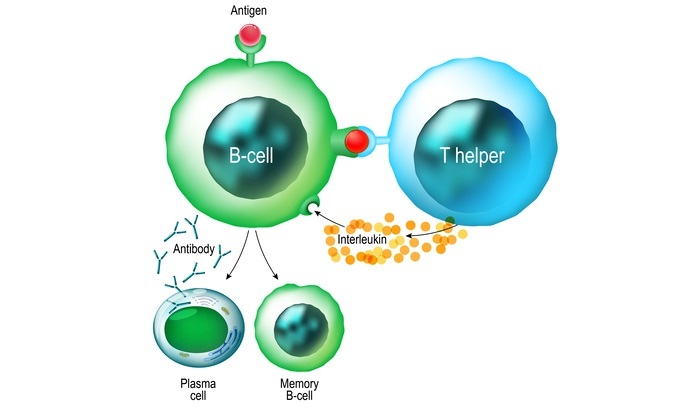
 Data Structure
Data Structure Networking
Networking RDBMS
RDBMS Operating System
Operating System Java
Java MS Excel
MS Excel iOS
iOS HTML
HTML CSS
CSS Android
Android Python
Python C Programming
C Programming C++
C++ C#
C# MongoDB
MongoDB MySQL
MySQL Javascript
Javascript PHP
PHP
- Selected Reading
- UPSC IAS Exams Notes
- Developer's Best Practices
- Questions and Answers
- Effective Resume Writing
- HR Interview Questions
- Computer Glossary
- Who is Who
Mechanism and Significance of Memory B Cells
Introduction
The human immune system is a complex network of cells and molecules that work together to defend the body against harmful pathogens. One of the key components of the immune system is memory B cells, which are responsible for the long-term immune response to infectious agents.
Memory B cells are the vital components of the adaptive immune system, allowing the body to mount a faster and more effective immune response upon exposure to the same pathogen in the future.

Mechanism of Memory B cells
B cells are a type of white blood cell that are part of the adaptive immune system. When an individual is exposed to a pathogen, B cells are activated and differentiate into two types of cells, plasma cells, and memory B cells.
Plasma cells are responsible for producing large amounts of antibodies that specifically target the pathogen. Memory B cells, on the other hand, are long-lived cells that retain the ability to recognize the pathogen and initiate a rapid immune response upon re-exposure to the same pathogen.

Memory B cells are formed in a process called somatic hypermutation, which occurs during the germinal center reaction. During this process, B cells undergo extensive genetic rearrangement, resulting in the generation of a diverse population of B cells that are specific for a particular pathogen.
The B cells with the highest affinity for the pathogen are selected to become plasma cells, which produce large amounts of antibodies. However, a small subset of B cells with lower affinity for the pathogen are selected to become memory B cells.
Memory B cells have a unique mechanism of activation that allows them to mount a rapid immune response upon re-exposure to the same pathogen.
When a pathogen is encountered for a second time, the memory B cells that recognize the pathogen are activated and differentiate into plasma cells, which produce large amounts of antibodies that specifically target the pathogen.
In addition, memory B cells are able to differentiate into long-lived plasma cells that can provide sustained protection against the pathogen.
Significance of Memory B cells
The important features of memory B cells are as follows ?
Memory B cells play a crucial role in the long-term immune response to pathogens.
They allow the body to mount a faster and more effective immune response upon re-exposure to the same pathogen, which can prevent the development of severe or recurrent infections.
Memory B cells also contribute to the development of herd immunity, which occurs when a large proportion of the population has been exposed to a pathogen and developed an immune response, thereby reducing the overall transmission of the pathogen within the community.
The significance of memory B cells is particularly evident in the development of vaccines, which rely on the induction of a long-term immune response to a pathogen.
Vaccines work by exposing the individual to a weakened or inactivated form of the pathogen, which stimulates the immune system to produce a specific immune response.
This immune response includes the formation of memory B cells, which are able to recognize and mount a rapid immune response upon re-exposure to the same pathogen.
This mechanism of action is what makes vaccines so effective at preventing the spread of infectious diseases.
Memory B cells also have important implications in the development of immunotherapy, which involves the use of the immune system to treat or prevent diseases such as cancer.
Immunotherapy works by stimulating the immune system to recognize and attack cancer cells, which are often able to evade the immune system.
The use of memory B cells in immunotherapy is still an area of active research, but there is evidence to suggest that memory B cells may be able to enhance the immune response to cancer cells, leading to improved outcomes for cancer patients.
10 Unknown Facts
Memory B cells can persist for decades, providing long-lasting protection against specific pathogens.
Memory B cells can differentiate into both plasma cells and long-lived plasma cells, which can provide sustained protection against a pathogen.
Memory B cells have a unique mechanism of activation that allows them to mount a rapid immune response upon re-exposure to the same pathogen.
Memory B cells are generated during the germinal center reaction through the process of somatic hypermutation, which generates a diverse population of B cells specific for a particular pathogen.
The development of memory B cells is dependent on T cell help, which provides signals that promote their survival and differentiation.
Memory B cells are a key component of the immune response to vaccines, which rely on the induction of a long-term immune response to a pathogen.
Memory B cells can contribute to the development of herd immunity, which occurs when a large proportion of the population has been exposed to a pathogen and developed an immune response, thereby reducing the overall transmission of the pathogen within the community.
Memory B cells have important implications in the development of immunotherapy, as they may be able to enhance the immune response to cancer cells.
Memory B cells are not specific to infectious pathogens, but can also be generated in response to non-infectious antigens, such as those found in vaccines.
The generation and maintenance of memory B cells is a complex process that is still not fully understood, and is an area of active research in immunology.
Conclusion
Memory B cells are a vital component of the adaptive immune system, allowing the body to mount a faster and more effective immune response upon re-exposure to a pathogen. They are formed through the process of somatic hypermutation during the germinal center reaction, and are able to recognize and differentiate into plasma cells upon re-exposure to the same pathogen.
The significance of memory B cells is particularly evident in the development of vaccines, which rely on the induction of a long-term immune response to a pathogen. Memory B cells also have important implications in the development of immunotherapy, as they may be able to enhance the immune response to cancer cells.

